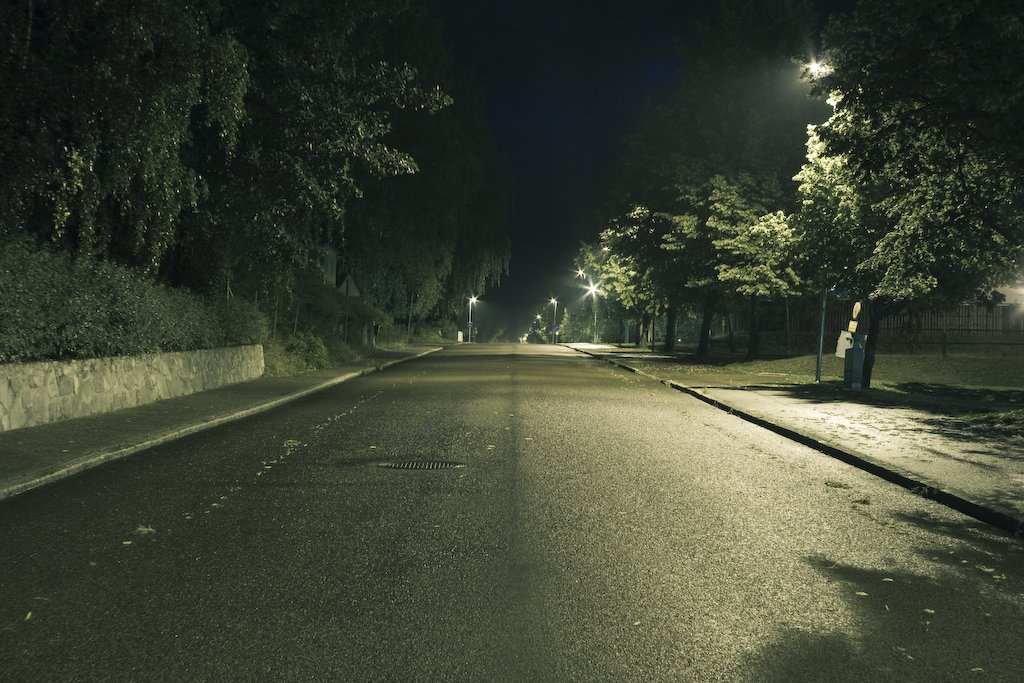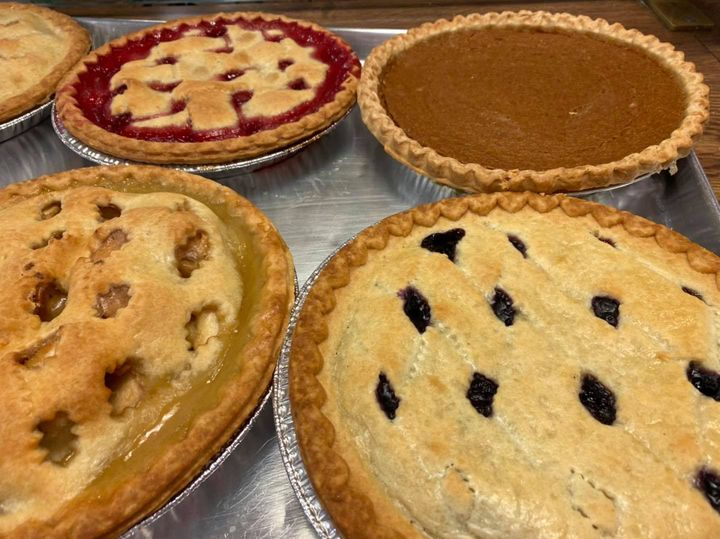The Fondue Writers are at it again. Thus begins our quasi-annual Free Flash Fiction Explode-A-Ganza. I’m up first, the rest of the authors will be at their level best between now and Thanksgiving.
Here’s my Short story: Confession:
************************************************************
Father Denneman placed a lit candle on the altar near the sanctuary of Our Lady of the Rosary Catholic Church, then stared into the flame for a while. The are no lights in the building, save for those still burning on the altar, and the dying sunlight of a mid-November evening dances through the stained glass windows depicting the stations of the cross, casting a kaleidoscope of colors and shadow onto the tabernacle, the pulpit and the pews behind.
Father Denneman sat on the front pew, watching the sunset through the windows. The church is empty. Even on Sunday mornings, when the old faithful – that’s what he has to call them, because they are old and they show up week in and week out, despite what weather and other natural disasters might beset the city – show up for their weekly sacraments and well-worn messages, it feels empty. It’s like the church was a balloon full of water and someone had nicked the bottom. The water never gushed out, but it was draining. He could feel it day after week after month after year.
It wasn’t always this way. Our Lady of the Rosary, or OLR as the community called it, had been a central figure in the city for as long as Father Denneman could remember. Through the economic boom times when the factories employed most of the men in the community to the economic downturns of the last few decades, Our Lady of the Rosary’s standard rollout of fish fries and prayer circles, Bingo nights, and holiday concerts had kept everyone together.
Then, COVID kept everyone in their homes for the better part of a year. Things opened up again in the Spring to wild fanfare, but ever since then, the emptiness only increased. Now, the church felt nearly deflated.
Father Denneman moved his hands in his pocket, felt the letter in his pocket. His hand lingered. A few of the candles on the altar flickered out.
Father Denneman made his way to the confessional. The youth choir would be here in an hour or so to practice for the Christmas Cantata. Father Denneman would hold confession until then and, although he attended his duties faithfully, there had been no visitors in several weeks, which is why he spent most of his time sitting in the front pew, watching the sunset through the stations of the cross, pondering the causes and effects of the world that seemed to shrink around him.
The door at the back of the church creaked open, and a woman entered.She walked slowly to the altar, lit a candle of her own, and turned towards the confession booth.
“Um … hello?”
“Hello.”
“Bless me Father? For I have sinned? Is that right?”
“More or less. Normally, I’d has how long it’s been since your last confession, but … “
“It’s been a while.”
“I figured.”
“I’m sorry, Father. I’m just so nervous. These old churches with their windows and old, carved wood. It makes me feel small.”
“You know what I did this morning when i woke up?”
“What?”
“I walked out here with my bowl of Wheates, kicked my foot into one of the pews, and swore, right there in front of God and Jesus and everything.”
She laughed a little. It was always nice to hear people laugh. Father Dennemen hadn’t heard much laughter outside his own in quite some time.
“You know what happened after that?”
“What?”
“Nothing. God didn’t come down from on high and lecture me about swearing in church. And all that fancy carved wood is just the same as cheap plywood as far as my toe is concerned. It hurts the same when I kick it.”
The woman laughed again. She was settling in.
“So how long HAS it been since your last confession?”
“Not since I was a kid. Twenty-five years? Thirty?”
“Why so long?”
“We went all the time when I was a kid: Mom, Dad, my sister, and me. I did Catholic school and everything. But Dad left us when I was in fourth grade.”
“I see.”
“Mom tried to keep us going for a year or so, but that didn’t keep. After that, Sundays were just like Saturdays but with less cartoons.”
“That happens a lot. When a marriage crumbles, it’s sometimes hard to hear God’s voice.”
“Or he sounds hollow.”
“That’s a bit pessimistic.”
“Maybe. It’s what Mom used to say when her church friends asked why she wasn’t at mass. ‘Have you opened your heart to hear God’s voice?’ and Mom would say, ‘Yes, and that voice is a shadow of what it used to be, if it’s even there at all.’”
“And what about you? Where is God in your life?”
“I don’t know. I’ve never seen God as someone who cared all that much about me.”
“You don’t think God cares about you?
“I don’t see the point. All those prayers, all those sermons. God’s still up there, we’re still down here, and that’s that.”
“You don’t believe?”
“It’s not a question of belief. It’s just hard to interact with something – or someone – who isn’t there.”
“Well, trust me, God believes…”
“God believes in me?” Anger flashed in the woman’s voice. “Is that what you were going to say?”
“Something like that, yes.”
“I knew it. You holy-than-thou people are all the same.” The woman gathers her things and starts to stand up.
“What’s wrong?”
“You think all people need a couple of bumpers sticker sayings and the occasional fish fry, and everything will be okay.”
“I’m sorry.”
“No. I’m sorry, Father. This was a mistake.” The woman moves to leave the confessional.
“You’re right,” Father Denneman speaks in a commanding voice. The woman stops.
“You’re right,” he says, this time barely above a whisper. “It was the wrong thing to say. I’m sorry. Can you forgive me?”
The woman stands in her spot for a long, quiet, moment.
“Yes,” she says, and sits down again.
“Thank you,” Father Denneman says.
The youth choir has arrived. Father Denneman and the woman can hear the choir bleachers expanding, papers rustling, the quiet chatter of children as they wait for the leader to give them instruction.
“Okay, everyone. Settle down. It’s time to start working. Line up and let’s start with warm up exercises.”
“I’m sorry,” Father Denneman says again. “You do this kind of thing long enough, you fall into a rut.” He pats his right hand over his pants pocket and looks down. “Sometimes, mistakes become reflexive. I’m sorry.”
“It’s okay,” the woman says. Then, in a lighter tone, “Things in the church must have changed since I was last here if the clergy are confessing to US, now.”
“You should see the sisters’ Friday night dance party when they think no one is watching.”
They both laugh. Long and loud. The kind of laughter that brings tears, despite your best efforts to keep it at bay. The youth choir stopped singing as they laughed. It’s not often you hear that sort of thing coming out of a confessional. sophos
“That was good,” Father Denneman says. “I haven’t laughed like that in a long time.”
“Me neither,” the woman says, and she grows quiet.
“Has something taken away your laughter, too?”
“My son,” she says.
“Kids can be difficult, sometimes.”
“He was never like that,” the woman said. “From the moment he was born, he was just the happiest kid. A face full of joy, my mom, his Grandma used to say. Smart, too. When he was in third grade, he won his classroom spelling bee and got to compete in the larger, school-wide spelling bee. That was third through eighth grade.”
“He was so excited! I told him not to get his hopes up. He was competing against seventh and eighth graders. He probably wouldn’t last long. But that didn’t stop him. He studied those practice words till he knew all of them and, on the day of the school-wide bee, he just kept spelling everything right until it was him and two eighth graders.”
“That’s impressive!” Father Denneman said.
“Yeah. Parents and teachers kept saying ‘Who’s that kid?’ and I’d respond, ‘He’s my son!’”
They laughed together.
“They eventually ran out of practice words. He got a few more right, but crashed and burned on the word PULCHRITUDINOUS.”
“What?”
“I know, right? What third grader knows how to spell that?”
“Or anyone. I’ve never even heard of it.”
“Me, neither. It means ‘displaying physical beauty.’ I had to look it up.He still go third place, though. Both of the eighth graders told him they’d have missed it, too. “He was always like that, though. Just smiling his way through all kinds of challenges.”
“Until..”
“The lockdowns were hard on him. He was always such an outgoing kid. He NEEDED other people. He couldn’t handle being stuck inside all the time, not being able to see anyone. A few months into online school and he just stopped doing work. He’d hide in his bedroom. He stopped eating.”
“They opened the schools up again midway through last year, but he was a different person. That smile was gone. HIs teachers said he stayed in the back row, never speaking. We tried to get him into some activities. Soccer. Basketball. Art Club. None of it worked.”
“I came home from work early this past May. I’d bought him his favorite ice cream. I wanted to see if he’d go for a walk with me down to the lake nearby. The house was quiet when I walked in. I called his name, but he didn’t answer.”
“When I went into his room, I found him in his closet. He’d hung himself with a belt.”
“I’m so sorry. You’ve been through a lot.”
“Thank you, father . . . but . . .”
“What?”
“That’s just something people say. They tell you they’re sorry and they’re trying to be nice, but I can’t help but think that what they’re really saying is ‘better you than me.’”
“I get that impression, too, sometimes.”
“Have you ever been through that?”
“I see it at funerals a lot. And some weddings, too, but I saw it firsthand a couple of years ago when my mother died.”
“Yeah?”
“Yeah. She was on her way to the library one day when another car ran a red light and broadsided her. She died almost instantly. People were sympathetic. Like you said, I think they were as genuine as they could be, but when I saw people laughing and joking over the veggie tray at her wake, I got a sick feeling in my stomach, and I had to leave.”
“Right, like you can’t stand to be around anyone.”
“I think it’s part of the natural grieving process. You need some time alone; otherwise it’s too easy to dull the pain with distractions. You never have to face it and you never move on.
“I tried to move on. I kept it together through the funeral; through everyone bringing over their stinking casseroles, asking their same stupud questions; through the few weeks I took off work. I’ve kept it together up till now. But, with the holidays coming, I just can’t. I can’t.”
“It’s okay if…”
“No, It’s not!” she shoots back to him, the anger welling up again. “It’s not. It’s my fault.”
“No.”
“Yes. I knew something was wrong. I knew. Me.”
“Everyone we knew was losing their jobs, and my husband was preoccupied with keeping his so we could stay afloat. His teachers couldn’t see anything through a computer screen. His friends were all weirded out from that much time in lockdown. But I’m his mother. I SAW what was happening and I just kept telling myself ‘It will be fine once school starts again, once things open up, once he can see his friends again. But it wasn’t. I knew it and I did nothing. I am a monster. I should have done better. There is no forgiveness for something like this.”
“… Excuse me, Father.” The woman steps out of the confessional, and Father Denneman can hear her crying. He puts his hand over his pocket, where the letter he never wanted to read has been waiting for him for several weeks.
He steps out of the confessional. She sees him and starts to walk away.
“Me, too,” Father Denneman says. The woman stops, turns, and faces him.
“What?”
“You think you’re a monster. So am I. Me, too.” He pulls out the letter. “This is from my father. I haven’t spoken to him in twenty years. I was a fresh-faced priest at the time, learning the ropes at a big church up north. One day, he walks into my confessional and tells me needs absolution. He says he’s leaving my mother, because he fell in love with some woman from work. I was furious. I screamed at him, called him all sorts of names, told him to get out and never come back.”
Father Denneman paused. “The looks on the faces of some of the folks waiting their turn to confess were somewhat less than contrite when they saw my display.”
“I cut him off after that. My father was my rock. He taught me everything I knew, including my faith and love for God. To me, it seemed like a betrayal I could never forgive; a betrayal God could never forgive.”
“Dad tried calling, but I never answered. He tried writing letters, but I would throw them away, unread. He even tried stopping in once or twice, but i was always unavailable. I simply cut him out of my life.”
“My sister called a little over a year ago to say he’d be diagnosed with cancer. Lung cancer, which makes sense since he’d smoked like a chimney his whole life. She said Dad had been asking if I could come around to visit. I almost did, a time or two, but then I remembered him sauntering into my confessional, telling me his news like he was letting me know he’d bought a new car or found a nice vacation spot in New England. I got mad and said no.”
“He died a little over a month ago. I did not attend the funeral. Only now, it was out of shame, not agner. I knew all along I needed to forgive him. All he ever wanted was for me to love him back. But I didn’t, and I couldn’t show up there in front of everyone and let them know how big a failure I was.”
“A few weeks ago, I got this letter from him.” Father Denneman opened the letter, and began to read.
“My Dear Son. This will probably be the last letter I write. I hope it finds you well. I want you to know two things. First, that I never stopped loving you, no matter how far apart we have been. And second, that I understand your silence and accept it. I regret leaving your mother, I regret not having tried harder with her or with you, and I regret all the lost years you and I never got to share. That’s my doing. God has forgiven me for it, and I hope you can one day forgive me as well. With Never-ending Love, Dad.”
Father Denneman put the letter back into his pocket. The youth choir began singing the first cross of Ave Maria.
“I don’t think you are a monster, but if you are, how much more of a monster am I?”
The woman stepped forward, put her hand on Father Denneman’s shoulder, and motioned toward the choir.
“They sound beautiful.”
“They do now. You should have heard them three weeks ago.”
The both laughed.
“What is your name, Father?”
“Tim. What is yours?”
“Anne.”
“Hello, Anne.”
“Hello, Tim.”
“You are not a monster, Anne.”
“Neither are you, Tim.”
“Thank you.”
“Thank you.”
Tim and Anne stood next to the confessional at Our Lady of the Rosary church and listened to the youth choir sing.
************************************************************
If you have the time, please check out the sites for ALL of the Fondue Writers: Joseph Courtemanche, Jamie D. Greening, Kathy Kexel, Derek Alan Elkins, Rob Cely, and Dr. Paul Bennet. If you like what you see, why not pick up a few copies of their books? It covers the cost of everything, and it gives us hope in those long, dark nights when we’re dreaming up new stories, wondering if the monsters in our heads matter only to us, or if one day they might come out of the dark to terrify you as well.
If you’d like what you see, you might also check out our first collection of short stories, The Covid Quarantine Catina, written during the first months of the Covid-19 lockdowns. It’s available in Kindle, Paperback, and Audio formats.
Rob Cely will be here on Wednesday with his next story. Until then, remember those you love, celebrate the people in your live and, as always, don’t break anything.











